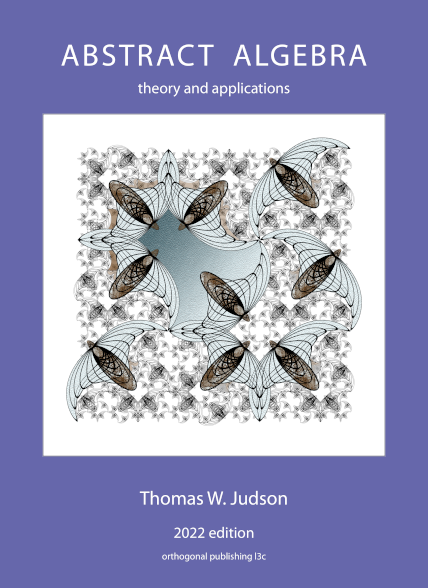Exercises 11.5 Additional Exercises: Automorphisms
1.
Let \(\aut(G)\) be the set of all automorphisms of \(G\text{;}\) that is, isomorphisms from \(G\) to itself. Prove this set forms a group and is a subgroup of the group of permutations of \(G\text{;}\) that is, \(\aut(G) \leq S_G\text{.}\)
2.
An inner automorphism of \(G\text{,}\)
is defined by the map
for \(g \in G\text{.}\) Show that \(i_g \in \aut(G)\text{.}\)
3.
The set of all inner automorphisms is denoted by \(\inn(G)\text{.}\) Show that \(\inn(G)\) is a subgroup of \(\aut(G)\text{.}\)
4.
Find an automorphism of a group \(G\) that is not an inner automorphism.
5.
Let \(G\) be a group and \(i_g\) be an inner automorphism of \(G\text{,}\) and define a map
by
Prove that this map is a homomorphism with image \(\inn(G)\) and kernel \(Z(G)\text{.}\) Use this result to conclude that
6.
Compute \(\aut(S_3)\) and \(\inn(S_3)\text{.}\) Do the same thing for \(D_4\text{.}\)
7.
Find all of the homomorphisms \(\phi : {\mathbb Z} \rightarrow {\mathbb Z}\text{.}\) What is \(\aut({\mathbb Z})\text{?}\)
8.
Find all of the automorphisms of \({\mathbb Z}_8\text{.}\) Prove that \(\aut({\mathbb Z}_8) \cong U(8)\text{.}\)
9.
For \(k \in {\mathbb Z}_n\text{,}\) define a map \(\phi_k : {\mathbb Z}_n \rightarrow {\mathbb Z}_n\) by \(a \mapsto ka\text{.}\) Prove that \(\phi_k\) is a homomorphism.
10.
Prove that \(\phi_k\) is an isomorphism if and only if \(k\) is a generator of \({\mathbb Z}_n\text{.}\)
11.
Show that every automorphism of \({\mathbb Z}_n\) is of the form \(\phi_k\text{,}\) where \(k\) is a generator of \({\mathbb Z}_n\text{.}\)
12.
Prove that \(\psi : U(n) \rightarrow \aut({\mathbb Z}_n)\) is an isomorphism, where \(\psi : k \mapsto \phi_k\text{.}\)
